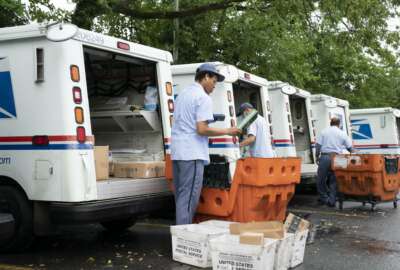
Hubbard Radio Washington DC, LLC. All rights reserved. This website is not intended for users located within the European Economic Area.
Hubbard Radio Washington DC, LLC. All rights reserved. This website is not intended for users located within the European Economic Area.
USPS and Customs and Border Protection officials expect only about two-thirds of international packages will include advanced electronic data meant to flag ille...
Best listening experience is on Chrome, Firefox or Safari. Subscribe to Federal Drive’s daily audio interviews on Apple Podcasts or PodcastOne.
Before the COVID-19 pandemic, the Postal Service has dealt with another public health crisis — illegal shipments of opioids to the United States.
The 2018 Synthetics Trafficking and Overdose Prevention (STOP) Act requires foreign post offices to include advanced electronic data (AED) on all U.S.-bound packages coming through the Postal Service, starting Jan. 1.
However, USPS told members of the Senate Homeland Security and Governmental Affairs Committee it saw, at most, two-thirds of international packages meet this data requirement at the start of this year. Citing disruptions in international mail caused by the pandemic, USPS data shows only 54% of incoming international packages had this data in October.
In addition, Customs and Border Protection told the committee more than 130 countries are eligible for waivers that would give them another year to comply with the STOP Act’s requirements.
Congress required private shippers to include this advanced electronic data (AED) on international packages in the aftermath of the Sept. 11 attacks. This data includes the package’s sender, recipient, weight and contents, and allows CBP to target high-risk packages.
However, Congress exempted USPS from those same requirements, and as a result, it’s become the preferred method for drug traffickers to ship opioids to the U.S.
Robert Cintron, the vice president of logistics for USPS, said the agency received almost no AED six years ago, but saw “peak” compliance this January when 67% of incoming international packages had this data.
The Postal Inspection Service, meanwhile, has reported a 71% drop in international seizures between 2018 and 2019, and a 93% drop in 2020.
USPS has worked with the State Department and the Universal Postal Union (USU) to build international compliance with the STOP Act’s requirements, and used commercial contracts with foreign post offices to reach bilateral or multilateral agreements.
However, Cintron told lawmakers that USPS and its partner agencies simply won’t see full compliance with the STOP Act by January.
“A portion of inbound international packages will not be accompanied by AED, and the Postal Service stands ready to keep these packages out of the U.S. mainstream,” Cintron said. “Absent alternatives, this will disrupt, to one degree or another, the flow of international mail.”
The STOP Act allows CBP to seize, destroy or make controlled deliveries of packages without AED. But Thomas Overacker, the agency’s executive director for cargo and conveyance, said CBP would conduct enhanced screenings of packages with drug-sniffing dogs and physical inspections.
But CBP personnel at international service centers and mail facilities have to figure out what volume of non-compliant packages it’ll receive next year, and whether or not it’s a manageable volume for the agency to process this way.
“We’ll have to make day-to-day decisions on that, based on the volume of mail without AED or the volume of mail that is comingled,” Overacker said.
CBP under the STOP Act was supposed to finalize regulations to clarify how it would deal with incoming packages without AED by October 2019, but the agency didn’t submit its proposed rule to the Office of Management budget until August 2020. Overacker said OMB returned the proposed rule to CBP in November and is going through department-level review.
Meanwhile, the STOP Act required USPS and CBP to complete a joint strategic plan for the management of AED by December 2018, but didn’t actually submit the plan until March 2019.
“Not a single important deadline was actually met,” said Sen. Rob Portman (R-Ohio), chairman of the HSGAC permanent subcommittee on Investigations.
Sen. Tom Carper (D-Del.), the subcommittee’s ranking member, said the agencies responsible did well meeting some of the law’s requirements, “but not well enough.”
“If I were assigned a grade to the effort we’re hearing about and discussing here today, I give it an incomplete, and we need to be hitting the ‘A’ mark.’ We’re improved, but there’s a heck of a lot more to do,” Carper said.
CBP determined 136 countries are eligible for one-year waivers, because they lack the technical capability to send this data to USPS, deliver a low volume of packages to the U.S. and are considered a low-risk country of origin.
“That waiver is not simply, ‘Oh, I don’t have to worry about this anymore.’ We communicate to them in the notifications that they still must work to get to 100%,” Overacker said.
For context, the countries not receiving waivers account for up to 85% of incoming international packages.
Lawmakers questioned whether the number of waivers granted would encourage smugglers to route drug shipments through exempt countries, but Overacker said CBP would scrutinize incoming package trends, such as a sudden increase in volume from a particular country.
“Anytime you squeeze a balloon in one place, it’s going to pop in the other. And let’s be honest, the drug trafficking organizations and others will try to exploit whatever weakness there is,” Overacker said.
Most illicit drugs go through the southern border, smuggled both on private and commercial vehicles. Over the past three years, CBP has initiated a major strategy to enhance screening capabilities and received $570 million from Congress for new equipment.
USPS, meanwhile, has worked with the State Department and the Universal Postal Union to increase STOP Act compliance from foreign post offices. USPS has provided nearly $18 million over five years to provide training seminars with postal operators around the world.
The State Department’s Bureau of Narcotics and Law Enforcement is also working with the USU to train international post offices to intercept suspected packages.
Eric Green, the director of Specialized and Technical Agencies at the State Department’s Bureau of International Organizational Affairs, said countries that don’t yet comply with the STOP Act have a strong economic reason to do so.
“In order to participate actively in e-commerce for their small businesses or consumers to really take advantage of these opportunities, they need to get on board and require and use the electronic data in order to facilitate their interactions with customs service, with other postal services,” Green said.
The State Department is also encouraging foreign post offices to develop apps that will handle AED and ensure compliance with the STOP Act.
“What we’re talking about here is allowing these countries to leapfrog the technology, so they’re moving from a paper-and-pen system, filling out customs forms, and they’re going to move immediately to a mobile app, where the customer can just enter the data about the package … and then match that with the barcode the postal service provides them,” Green said.
USPS is the world’s largest mail delivery agency, and has the leverage necessary to ensure compliance from its top international partners, but Sen. Maggie Hassan (D-N.H.) said any resulting slowdowns in international shipping couldn’t come at a worse time for the agency.
“The Post Office, already having been impacted by the pandemic, may in fact have to spend more of its time at the height of people needing the post office at its full capacity, may need to be turning back packages and spending time and effort because CBP did not do its job — and that is unacceptable,” Hassan said.
Copyright © 2024 Federal News Network. All rights reserved. This website is not intended for users located within the European Economic Area.
Jory Heckman is a reporter at Federal News Network covering U.S. Postal Service, IRS, big data and technology issues.
Follow @jheckmanWFED

